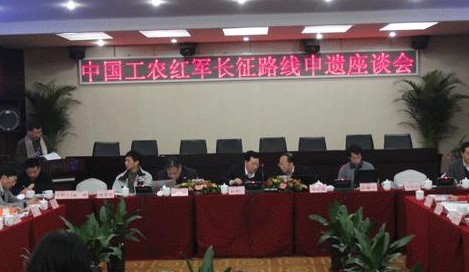The Long March route: a new addition to the list of World Heritage?

Survey of Long March sites embarked in Sichuan on March 26th.
On March 26th, a team of experts from the Sichuan Academy of Social Sciences (SASS) embarked on a survey of Long March sites in Sichuan Province starting at Luzhou (a prefecture-level city located in the southeast of Sichuan Province). An expert from Sichuan Academy of Social Sciences explained that the cultural resource survey is being conducted by four different groups, all together covering ten cities and regions successively, with first group surveying Luzhou, Qionglai and Mianyang, the second group conducting investigations in Liangshan and Ya’an, the third group making an in-depth analysis in Ngawa Tibetan and Qiang Autonomous Prefecture and Garze Tibetan Autonomous Prefecture and the fourth group completing the investigations in the cities Dazhou, Bazhong, and Guangyuan. The entire survey process will last until the end of May.
The objective of the cultural resource survey team is to get a clear and unified picture of rich pockets of culture scattered along Sichuan passage of the Long March route—a crucial step in applying for recognition as a World Heritage site. The SASS expects that the survey team’s trip to Luzhou will strengthen the development and utilization of cultural resources embodied in Long March sites in Sichuan Province. Their research work will ultimately facilitate the preservation of Long March sites as cultural relics, providing more primary and tangible sources for the mystique and patriotism that the Long March signifies in national heritage. The survey team’s results will provide useful materials for the preparation of the World Heritage application.
As part of the survey, the team will convene panel discussions at each investigation site to talk about issues surrounding preservation and the tasks involved, as well passing down the Long March spirit. In conducting these panels, experts will connect closely with the local people and learn from their comments and insights with regard to the World Heritage application. At the same time, the application process is itself an opportunity to benefit from the collective wisdom on both handling and developing cultural resources and boosting local socioeconomic development. Along these lines, an expert emphasized the innate potential of group effort to realize a multifaceted and pluralistic outcome.
In addition to the discussion panels, a huge part of the survey team’s task is to conduct field research and evaluate Long March sites and relics and Long March memorial halls. These tasks are primarily directed at preparing to choose appropriate locations for the next step of the World Heritage application process.
The Chinese version appeared in Chinese Social Sciences Today, No. 433, March 29th, 2013
Translated by Zhang Mengying

 PRINT
PRINT CLOSE
CLOSE